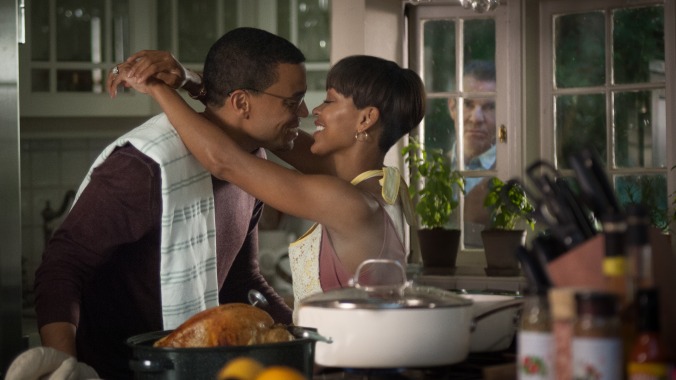That last aspect puts The Intruder into a rather rarified category as far as potboilers go: Don’t be surprised if, a generation or two from now, B-movie scholars revive The Intruder, citing it as a searing-if-campy statement on race relations in early 21st-century America. And it does work as a metaphor for shifting paradigms of power in the U.S, and the backlash against those shifting paradigms that put Donald Trump in the White House in 2016. The new is personified here by Scott Russell (Michael Ealy), a San Francisco marketing executive with enough liquidity to indulge the request of his wife Annie (Meagan Good) that they buy a $3.5 million Napa Valley estate almost on a whim. Scott hates guns, hires contractors to mow his lawn and fix his roof, and prefers Chardonnay to Budweiser. In short, he’s a very modern model of a man. Some might even call him soft.
But his (self-made) wealth gives him leverage over the house’s previous owner, middle-aged gun nut and craftsman Charlie Peck (Dennis Quaid), introduced wearing a less-than-subtle red baseball cap and blowing away a deer with a shotgun. After giving Scott and Annie a tour of the property at the beginning of the film, Charlie makes a racist comment questioning Scott’s ability to “afford” the house, prompting Scott to close the deal the next day almost out of spite. Thus begins a power clash between Scott and Charlie—and by extension, new money and old money, urban and rural, non-white and white. And Charlie, the white man in the red hat, won’t give up his ivy-covered country home—and therefore, his status—so easily, even though he’s the one who sold it in order to pay off his many debts.
The conflict between the two men evolves into a struggle for possession of Annie, introducing a sinister undercurrent of sexual violence to what’s otherwise a self-consciously silly film. There’s plenty to be said about pervasive sexual violence against black women as a tool of white supremacy, but in this film the character of Annie is portrayed as an archetype traditionally associated with white women: She’s an ideal wife (and, as she states repeatedly throughout the film, future mother) in the Victorian mold, beautiful, intelligent, and highly sophisticated but ultimately content to remain in the domestic sphere cooking and decorating the house. She also, it must be said, has nary a lick of street smarts, and continues to be nice to Charlie long after it’s become clear that he’s not dropping by unannounced at all hours of the day and night simply because he’s lonely.
That’s where the B-movie DNA of The Intruder overtakes its political undertones, filling in the spaces around its straightforward plot with a loud and sometimes sloppy sound mix, generic R&B musical cues, and Quaid red-faced and screaming about how the lawn around the house is “getting out of control!” Sunburnt and ropy, Quaid gamely steps into the role of the emotionally unstable psycho, lurking menacingly in the rear of the frame, leering face illuminated by cracks of lightning in multiple scenes of the characters waking up in the middle of the night to investigate strange noises. His performance produces its share of gleeful tittering, but the biggest laughs in the film come courtesy of Ealy, whose skeptical facial expressions reflect how any sensible person would react to the inexplicable decisions made by the rest of the characters in the film. Better still, many of those laughs appear intentional.
As for Good, she does her job, which is to keep the plot moving through force of sheer naïveté. This, too, occasionally veers into the comedic, as when Scott shows her a rusty red-brown stain on the wall of one of the house’s many bedrooms, and she replies, “I don’t know, do you think that’s blood?” (Reader, it is definitely blood.) But Annie’s eternal gullibility also reflects The Intruder’s biggest flaw. The film is so full of jump scare fake-outs and shout-at-the-screen moments, it neglects to build sustained suspense—a far worse sin than its lack of logic, which can actually be kind of fun. There’s really only one sequence in The Intruder that’s truly pulse-pounding, and it comes towards the end of the film, when Annie finally figures out what can practically be seen from space at this point: Charlie is not the harmless, grandfatherly man he pretends to be. The rest is all cheap tricks and bluster. Some things never change.













![HBO teases new Euphoria, Larry David, and much more in 2026 sizzle reel [Updated]](https://img.pastemagazine.com/wp-content/avuploads/2025/12/12100344/MixCollage-12-Dec-2025-09-56-AM-9137.jpg)




























